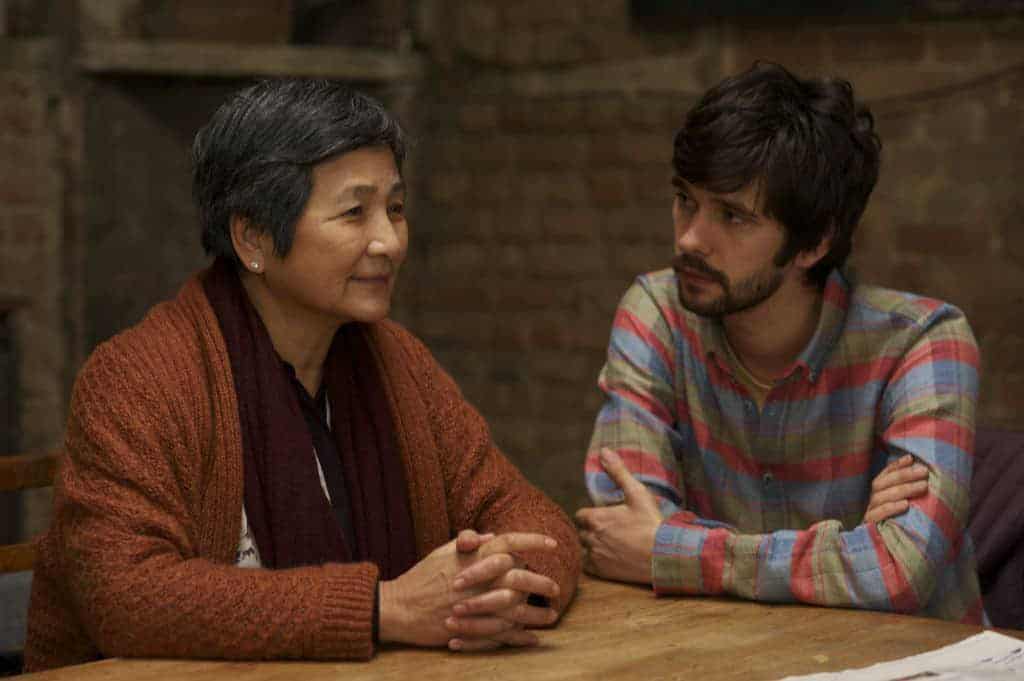Hong Khaou’s feature film debut, Lilting, is an exploration of grief, family, and the trauma of immigration. The film premiered at Sundance.

Is there anything Ben Whishaw can’t do? He played Hamlet in the West End at twenty-three, Keats in Bright Star, Q in Skyfall, a timid but potentially dangerous young man in Criminal Justice, and Shakespeare’s Richard II. In the new film Lilting, he gives yet another BAFTA-worthy performance as Richard, whose lover Kai recently died, leaving Richard responsible for his mother, Junn (Pei-Pei Cheng).
When Richard first visits Junn in her home for the elderly after Kai’s death, he discovers that she has a new English lover. Despite moving to England thirty years ago, she never learned the language. Keen to help her out, he engages an amateur translator (Naomi Christie) to help them communicate, which also gives Richard an excuse to visit and work out how to proceed.
Writer-director Hong Khaou mostly achieves a delicate balancing act of pointing out the limitations of communication between people who don’t share a common language, and how words can even be a barrier to communication: once Junn can converse with her lover, they discover their differences and things go poorly. It’s occasionally a bit on the nose, but it’s an often moving exploration of how we connect – or fail to -with other people through language.
Richard and Junn had a strained and abortive relationship when Kai was alive. Junn didn’t know that her son was gay, assumed that Richard was merely his roommate, and she was jealous of the hold Richard had on her son. Kai’s inability to come out to his mother often left Richard feeling slighted, and now that Kai is gone, Richard is in the difficult position of carrying Kai’s secret as well as the burden of his anger towards his mother. He’s a quiet and kind-hearted man, desperately trying to do the right thing, grieving the love of his life, and having a hard time holding it all together.
Junn is incredulous about why a friend of her son’s, one she didn’t even like, would suddenly be so concerned with her well-being, but he’s not at liberty to explain their real connection. She often launches attacks at him, and Richard exercises great restraint. We see him struggle to keep his myriad of conflicting emotions from bubbling to the surface. Kai resented his mother for never assimilating into English culture; she was heavily dependent on her son, which left him burdened with guilt. So many things were left unsaid between mother and son that Richard finds himself needing to air, yet is ill-equipped to do so.
Lilting is a confident and ambitious first feature from English-Cambodian Khaou, despite its small cast and simple premise. Khaou intersperses the present-day interaction between Richard and Junn with their respective idealized, and occasionally morphing, memories of Kai: the intimacy he and Richard shared, and the image of a loving and doting son. There’s a poetic quality to the film as it jumps around in time, its characters bathed in soft, wintery light. The film is about a lot of things – the trauma of the immigration experience, barriers to communication, and recovering from losing a loved one – yet, at its core, it is a moving study of these two good-natured characters finally finding common ground in their shared grief. And Khaou emerges as one of the most exciting new talents to debut at Sundance this year.
Read more: Review: Louder Than Bombs is a deeply empathetic look at family, grief, and memory >>

